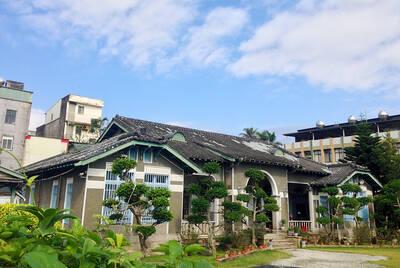The oldest profession in the world will take center stage this weekend in Taipei with the 4th International Sex Workers Culture Festival (國際娼妓文化節) highlighting the plight of workers in the profession and the many associated social, political, health and economic issues related to prostitution.
Organized by the Collective of Sex Workers and Supporters (COSWAS, 日日春關懷互助協會), events set to take place over the next four days have been given the label of a festival, though the series of seminars, workshops and tomorrow's march have serious undertones that are hard to equate with the carefree spirit of a carnival.
The sex industry has been the source of heated debate since the Ministry of the Interior on Jan. 6 announced a reform plan that reportedly would decriminalize most aspects of the industry and even raised the possibility of establishing red-light districts. This Wednesday, however, the director of the ministry's Department of Social Affairs Chiu Ju-na (邱汝娜) responded at a protest action by the Garden of Hope Foundation (勵馨社會福利事業基金會) by saying the report in the China Times (中國時報) had overstated the reform proposal and that the ministry was currently only considering decriminalizing sex workers.

PHOTO COURTESY OF COSWAS
If this first-step reform ultimately is approved, it would end one of the only issues on which COSWAS and the Garden of Hope Foundation find common ground, namely that the current practice of fining and jailing prostitutes, but not their customers, is wholly unjust. Secretary of COSWAS Chung Chun-chu (鐘君竺) said the current system lends itself to abuse from police, customers and prostitutes alike.
"Police officers will pay prostitutes to report on other prostitutes to reach their arrest quotas. Or the cops will simply give a man money and then follow him to the location or show up at an appointed time," Chung said.
Issues such as these will get a full airing during two open debates at Taipei City Council set to take place today at 1pm and Monday at the same time. To help back the case of local sex workers, COSWAS has invited representatives of sex-worker unions from England, Cambodia and Thailand, as well as human rights and women's rights activists from the US, Singapore and Hong Kong to discuss the varied experiences of sex workers in achieving the decriminalization of their trade.

PHOTO COURTESY OF COSWAS
Two workshops set to take place tomorrow and Sunday at Taipei Artist Village (admission for women only) have been designed to perform and teach erotic dancing techniques. "These are very popular events because most Taiwanese women perceive prostitutes as having a very close and special relationship with their bodies. They're very curious about this," Chung said.
The main public events, though, will be tomorrow's parade, which will see participation from the international guests, who in years past have put on some fairly flamboyant and memorable street shows for the festival, and the party on Sunday at Guisui Theater Park.
Being an election year, this year's event has a political tint as the parade route starts at the Zhongxiao-Fuxing Sogo Department Store and leads to the presidential campaign headquarters of the DPP and the KMT/PFP.

PHOTO COURTESY OF COSWAS
"We want the candidates to sign a petition that commits them to a timetable for adopting the reform that they proposed," Chung said.
When Chiu met the Garden of Hope protesters, who would rather see the sex trade in Taiwan eradicated than decriminalized, outside the Ministry of the Interior on Wednesday, she said the government would allow for greater public debate of the issue before her department pressed ahead with the reform plan, which casts some doubt over the likelihood of DPP representatives meeting the paraders with any intention of signing a petition.
Likewise, the KMT/PFP camp will be unlikely to stick its neck out on this loaded issue. Nevertheless, the parade will be an opportunity for participants to put on a show and no doubt get plenty of attention from the media and public. After all, there's nothing the TV news likes better than a story with a sex theme.

PHOTO COURTESY OF COSWAS
But the issues behind the bared breasts -- if, indeed there are any tomorrow -- are large and the attempts on the part of the festival to stimulate discussion are noteworthy when considering the facts about prostitution in Taiwan.
According to the National Police Administration, more than NT$22 million in fines ranging from NT$3,000 to NT$30,000 were collected from prostitutes last year and almost NT$250 million in fines have been levied over the past decade. On top of the fines, about 37,000 days, more than 100 years, of jail time have been served over the past decade by prostitutes caught on the job.
A conservative estimate that COSWAS provided and was attributed to the police has 50,000 sex workers active in Taiwan. A loose calculation of their earnings at NT$2,000 per day would put the total income of the sex industry at NT$36.5 billion per year, much of it currently making its way into the pockets of pimps, gangsters and middlemen.
"We're hoping that by providing cultural activities, like parties, exhibitions and workshops, we'll attract attention to the issues from people who would otherwise shun the topic of prostitutes," Chung said. "We know from experience that most people don't want prostitution totally banned, nor completely legalized. This event aims to help the public try to find the middle ground."

From the last quarter of 2001, research shows that real housing prices nearly tripled (before a 2012 law to enforce housing price registration, researchers tracked a few large real estate firms to estimate housing price behavior). Incomes have not kept pace, though this has not yet led to defaults. Instead, an increasing chunk of household income goes to mortgage payments. This suggests that even if incomes grow, the mortgage squeeze will still make voters feel like their paychecks won’t stretch to cover expenses. The housing price rises in the last two decades are now driving higher rents. The rental market

July 21 to July 27 If the “Taiwan Independence Association” (TIA) incident had happened four years earlier, it probably wouldn’t have caused much of an uproar. But the arrest of four young suspected independence activists in the early hours of May 9, 1991, sparked outrage, with many denouncing it as a return to the White Terror — a time when anyone could be detained for suspected seditious activity. Not only had martial law been lifted in 1987, just days earlier on May 1, the government had abolished the Temporary Provisions Effective During the Period of National Mobilization for Suppression of the Communist

When life gives you trees, make paper. That was one of the first thoughts to cross my mind as I explored what’s now called Chung Hsing Cultural and Creative Park (中興文化創意園區, CHCCP) in Yilan County’s Wujie Township (五結). Northeast Taiwan boasts an abundance of forest resources. Yilan County is home to both Taipingshan National Forest Recreation Area (太平山國家森林遊樂區) — by far the largest reserve of its kind in the country — and Makauy Ecological Park (馬告生態園區, see “Towering trees and a tranquil lake” in the May 13, 2022 edition of this newspaper). So it was inevitable that industrial-scale paper making would

Hualien lawmaker Fu Kun-chi (傅?萁) is the prime target of the recall campaigns. They want to bring him and everything he represents crashing down. This is an existential test for Fu and a critical symbolic test for the campaigners. It is also a crucial test for both the Chinese Nationalist Party (KMT) and a personal one for party Chairman Eric Chu (朱立倫). Why is Fu such a lightning rod? LOCAL LORD At the dawn of the 2020s, Fu, running as an independent candidate, beat incumbent Democratic Progressive Party (DPP) lawmaker Hsiao Bi-khim (蕭美琴) and a KMT candidate to return to the legislature representing